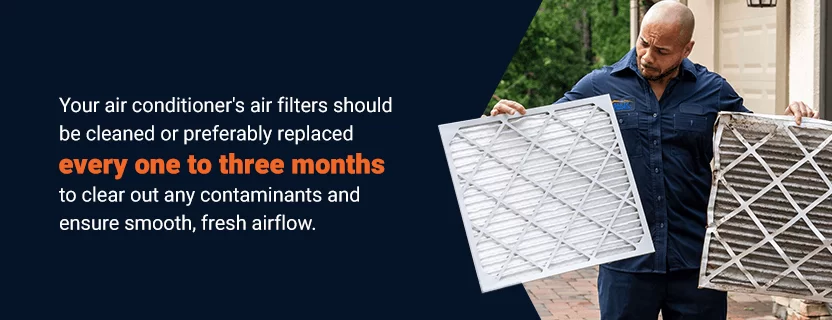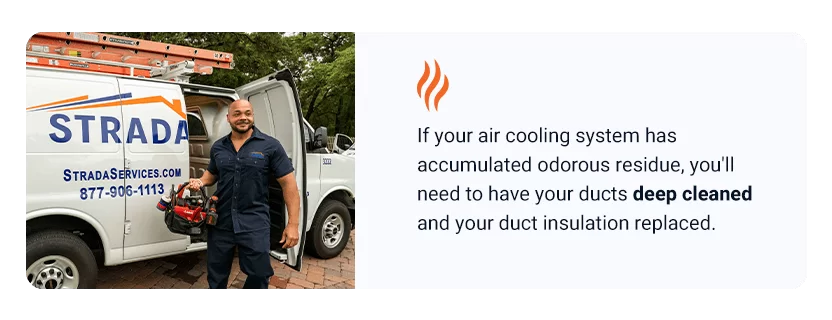
Air conditioners are designed to blow out a cool, refreshing breeze with no particular smell, and with consistent maintenance and good everyday treatment, they do just that. However, wear and tear, contamination, age, and other factors can interfere with their normal operation and disrupt their airflow’s neutral scent. This guide shows you how to fix AC odor, what causes these unwanted smells and how to ensure your cooling system stays odor-free all year round.
Musty odors are usually caused by mold or mildew, two fungi that love to grow in damp areas of the home. If moisture builds up in your AC unit, mold or mildew may grow on its air filters, evaporator coils, cabinet, blower wheel or duct network. Air flows over the fungi as you use your air conditioner, picking up the scent and projecting a musty smell into your home. Southeastern states are particularly prone to humidity, increasing your chances of mold and mildew growing in your cooling system.
It’s critical to address any fungal growths you see or smell in your home promptly, as spores can trigger breathing concerns, allergies, asthma and other health issues in both people and pets. If you notice a musty smell, switch off your air conditioner to prevent spores from spreading. Have your system thoroughly inspected and cleaned by a professional AC technician to ensure you’ve located and eradicated all sources of smell, even in more hard-to-reach, hazardous places.
Your air conditioner’s air filters should be cleaned or preferably replaced every one to three months to clear out any contaminants and ensure smooth, fresh airflow. Clear filters also prolong your unit’s life span and lower your utility costs, as your AC doesn’t have to battle clogs to achieve your desired room temperature. You can reduce your home’s indoor humidity to less than 60% using a stand-alone dehumidifier or replace your old air conditioning system with a modern one with a built-in dehumidifier for best results.

If you smell chemicals when you switch on your cooling system, you may have a cooling fluid or refrigerant leak. Refrigerant leaks are usually caused by small cracks or holes in metal pipes or coils caused by wear and tear, corrosion, mechanical damage, excessive pressure, faulty parts, or loose connections. Chemical odors from cooling fluid leaks can smell like car exhaust fumes, nail polish, ammonia or antifreeze.
Refrigerant leaks can cause dizziness, headaches and respiratory problems, and they can also harm the environment. Immediately switch off your AC unit and open windows to ventilate the space if you detect a chemical smell. For safety, don’t attempt any DIY solutions. Instead, call a heating, ventilation and air conditioning (HVAC) specialist to find the leak, diagnose the problem and replace any damaged parts.
To keep your AC’s cooling fluid safely inside coils and pipes, doing its job effectively, you’ll need to schedule regular inspections and maintenance services with an experienced, reliable HVAC technician. Ideally, your AC and heating system should be professionally tended to twice a year to extend their life span, reduce utility costs, prevent future breakdowns, optimize temperature regulation and prevent unwanted chemical odors.
Refrigerants don’t always smell like chemicals. Some types of cooling fluids, like R-22 (chlorodifluoromethane), can actually have a faint fruity or sweet scent, sometimes with a subtle ether undertone. You should treat this AC odor exactly like you would treat the chemical smell discussed above and be wary of refrigerant leaks. Shut down the unit and ventilate the area, then contact a professional to diagnose and repair the system. Be sure to schedule regular maintenance for your air conditioner in the future.
The smell of sulfur is commonly associated with rotten eggs. If you catch a whiff of something eggy and unpleasant coming directly out of your air conditioner, the culprit is probably a small animal decomposing somewhere in your cooling system, giving off sulfur and other gases. However, it’s also possible that a natural gas-powered appliance in your home is leaking, your drywall needs replacing or you have plumbing problems.
You must first rule out a gas leak before investigating any other potential causes, as gas leaks can be extremely hazardous. Immediately call a professional gas company for an emergency consultation and have a technician inspect your appliances for leaks. Once the technician has ruled out natural gas as a potential cause, inspect your plumbing for issues. If your plumbing is fine, call an HVAC specialist to examine your AC for dead animals in ducts or signs of drywall sulfur on your copper AC pipes.
While air conditioners are rarely the source of sulfuric odors, you can still protect your home against unlikely occurrences by having your AC and duct network regularly maintained, cleaned and inspected for signs of invading creatures like stowaway rodents. If technicians discover some, you can have a pest control service remove them quickly before any die and start smelling bad. Moldy AC units can also smell vaguely eggy, so an HVAC inspection will address this problem, too.

A burning smell coming from your cooling system can indicate electrical problems such as frayed wires, overheating motors or other malfunctioning or damaged hardware. If you’re turning on your AC for the first time in several months and are met with this smell for the first few minutes, it could simply be from built-up dust and debris burning off the hot metal components. If the smell occurs during regular use or does not dissipate, you may need some AC repairs.
Electrical issues need to be dealt with promptly for safety’s sake. Switch off your air conditioner, open some windows for ventilation, and leave the area while you call an AC inspection and repair service. Based on the damage, they will determine whether your unit needs a thorough cleaning, new parts or a complete replacement. Even if your AC is simply burning off accumulated dust and debris, that’s a good indication that the components need cleaning, so calling a professional is still recommended.
Consistent AC upkeep lets you solve problems before they happen, so a cooling system treated to regular inspections and services is far less likely to reach a burning point. You should also consider replacing cooling and heating systems that are more than 10 years old, especially if they need significant repairs. Newer systems are more cost-effective to run, have more customizable features and can even earn you tax credits and rebates if you pick an energy-efficient, qualifying system.
If your AC emits a sour or vinegary smell, you may have stagnant water in the drain pan that collects condensation or clogged drain lines. When moisture builds up and sits too long in one place, it provides a nice home for bacterial colonies to grow, and these bacteria give off odors that can smell acidic like vinegar.
Fortunately, vinegary drain pans and drain lines are usually relatively easy to handle yourself. If you have central air conditioning or a ductless mini-split system, the drain pan will be under the coil inside the main indoor cooling part of the AC. The drain lines for both are connected to this pan and run outside to get rid of excess water. You’ll likely need a screwdriver to access the compartment.
To clear a clogged drain line in your air conditioning system, you’ll need to fight vinegar with vinegar. Switch off the AC and then pour a cup of white vinegar or bleach down the drain line and let it sit for about 30 minutes to break down any debris. Afterward, flush the line with water to make sure it’s clear. To clean the drain pan, first remove any standing water with a sponge, then scrub the pan with warm, soapy water or vinegar. Rinse it thoroughly, and then put the clean pan back in place.
If your drain pan or drain line becomes contaminated or blocked frequently, contact a professional so they can determine the bigger problem and fix it.
Scheduling twice-annual inspection and maintenance, keeping the outdoor unit clear of debris, and regularly cleaning or replacing the air filters will all help prevent drain lines from clogging and dissuade bacterial growth in the drain pan. You could also consider installing a float switch that shuts off the AC unit if water backs up in the drain pan, giving you a warning before bacteria have time to grow and produce smells.
Bacteria and fungi can also produce a smell reminiscent of dirty socks. Intense humidity, condensation buildup, leaks, moisture-trapping dust and restricted airflow due to dirty filters or covered vents can all contribute to mold and bacterial growth. Check your drain pan and drain line for stagnant water or blockages, and clean them out using the steps above if you find your source. If not, speak to an AC specialist about potential mold buildup in the system and have them diagnose and clear out the fungi safely.
Smoke from cigarettes, cigars, hookah pipes and other combustible substances doesn’t completely dissipate after it hits the air. Leftover particles called “third-hand smoke” accumulate on surrounding surfaces, which is why the white ceilings of heavy-smoking households often have a greyish-brown tinge. Similarly, air conditioners, duct networks and insulation that have been processing air filled with smoke will build up residue over time. When you switch on your AC, the air flows over this residue and picks up the stale smell.

If your air cooling system has accumulated odorous residue, you’ll need to have your ducts deep cleaned and your duct insulation replaced. Replace your old air filters with high-efficiency particulate air (HEPA) filters designed to capture smaller smoke particles. This will help improve indoor air quality and reduce lingering odors. Air purifiers and ozone generators can further help neutralize the lingering odors.
Ensure that household members and visitors smoke outdoors and away from the outside air conditioning unit. If this is not an option due to weather or safety concerns, designate a smoking-friendly room in the building that has no connection to the air conditioner or its duct network to keep the particle residue trapped in one location. You could also install an independent wall-mounted or window AC in that room separate from your home’s system. Keep the door permanently closed to prevent any stray smoke from escaping.
If you detect a fishy or burnt plastic smell coming from your air conditioning system, it could mean that electrical components like wires and circuit boards in your AC are overheating. As these components heat up, the plastic insulation and heat-resistant chemicals surrounding the circuitry may begin to break down and give off foul-smelling, fishy fumes.
If you notice a fishy smell coming out of your AC, it’s crucial to act quickly for safety. First, turn off your air conditioning unit to prevent further damage and potential hazards. Open your windows to release any polluted air indoors and allow fresh outdoor air to circulate inside. Avoid using the AC until the issue is resolved, as continuing to run it may exacerbate the problem. Dial emergency services if you see smoke or sparks coming from the unit.
Next, promptly contact a qualified HVAC technician to inspect your cooling system’s inner workings. After checking for problems like electrical faults, damaged wiring, mechanical issues or refrigerant imbalances, the technician will diagnose the issue. They’ll talk to you about the necessary repairs, replacements or maintenance plans they recommend.
To minimize the risk of fishy odors in the future, schedule regular maintenance checks for your HVAC system. Technicians can identify potential electrical issues before they escalate and ensure all components are functioning properly. Additionally, watch for any strange sounds or smells during regular use. These can be early warning signs of underlying problems that need addressing.
If you’ve noticed unwanted odors coming from your air conditioning system or it’s time to upgrade your AC to prevent future issues, you can rely on Strada Air Conditioning & Heating to help. Our expert technicians prioritize your comfort and well-being while delivering premium services and top-quality products for both cooling and heating systems. We understand how important a healthy indoor environment is for you and your family, and we’re committed to making that possible.
Since 2003, we’ve served valued clients across the southeastern United States and helped them manage the notorious heat and humidity with efficiency and ease. Whether you need a thorough inspection of your air conditioning system, professional odor diagnostics, HVAC remodeling and repairs, scheduled AC maintenance plans, or new unit or duct installations, you can reach out to us online today and find your solution.
